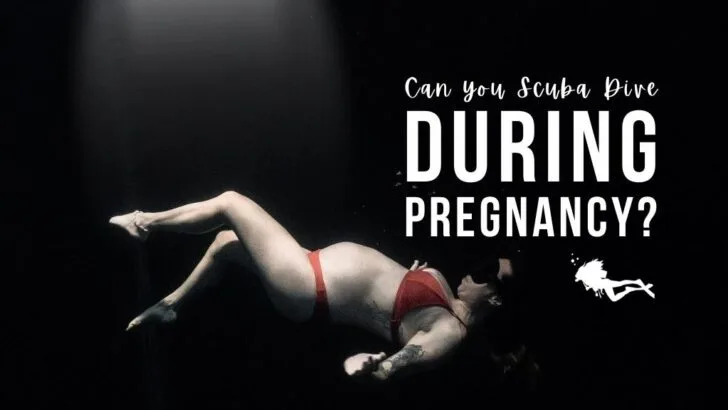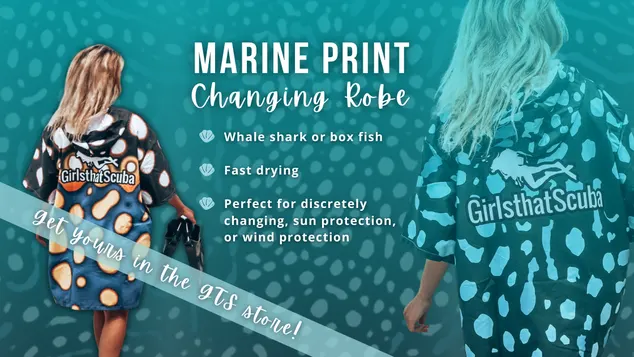For many people, finding out that they are going to become a parent is one of life’s most joyous occasions. However, scuba diving while pregnant is not recommended. So for divers, the realisation soon sinks in that it will mean 9 months (or more) of no diving.
Most divers can recall from their Open Water training that diving isn’t recommended during pregnancy. Despite this, there is very limited research available to explain the risks further. So here at Girls that Scuba, the world’s largest scuba diving community for women, we wanted to dig a little deeper to find out exactly why you shouldn’t go scuba diving while pregnant.
Please note, this information is based on recommendations from DAN (Divers Alert Network). If you need more insight, please give them a call or email. You should always consult your own doctor first during pregnancy.
Surveys About Diving During Pregnancy
For ethical reasons, there haven’t been any experiments conducted on humans. Surveys have been conducted on women who have given birth after scuba diving, but these tend to be somewhat inconclusive. They have weaknesses, as surveys are not as easily controlled as laboratory research. In some cases they can also be biased.
One survey of divers who had recently given birth included 69 women who had not dived, and 109 women who had. The non-diving group reported no birth defects, while the divers reported defects at an incidence of 5.5%. This rate of occurrence was normal for the national population.
Diving could not conclusively be held responsible for the issues, which could have been caused by any number of unrelated factors. The small sample size makes these results difficult to determine. While surveys can establish correlations, they cannot confirm a relationship between two factors.
Hyperbaric Chamber Animal Studies
Hyperbaric chambers simulate the increased pressure of diving, and are often used to treat decompression sickness. They can also be used for research. Chambers have been used to test the effects of diving on some pregnant animals, with the results pointing to how this might work in humans.
Hyperbaric chamber studies have allowed scientists to examine a few factors which might affect fetal development when scuba diving while pregnant. Rats and hamsters have been used to study the effect of hyperbaric oxygen (breathing oxygen under pressure) on fetal development.
Hamsters were also used to study decompression sickness, as well as sheep. Sheep are often used for these types of studies, as their placenta is very similar to a human placenta.
These chamber studies have shown a range of developmental abnormalities. These include low birth weights, fetal abortion, bubbles in the amniotic fluid, premature delivery, abnormal skull development, malformed limbs, abnormal development of the heart, changes in the fetal circulation, limb weakness and blindness.
You can read more about the scientific conclusions of these studies on the DAN website.
Scuba Diving While Pregnant
As well as the potential risks to the baby, there are also concerns for the person who is scuba diving during their pregnancy. Pregnant people often experience swelling in their sinuses which can affect equalisation.
There are also a number of strenuous factors involved in a regular dive day. Carrying heavy scuba equipment would not be advisable during pregnancy. If you’re prone to seasickness, this probably wouldn’t pair well with any nausea caused by morning sickness.
There’s also the practicality of fitting into scuba equipment. Dive gear isn’t well adapted to women’s bodies at the best of times, so trying to fit a growing bump into a wetsuit or BCD would not be an easy task!
Want to know which wetsuits can still accommodate a bump for other water adventures? Check out Girls that Scuba founder Sarah trying on her wetsuits at 6 months pregnant.
Other Water Activities During Pregnancy
While diving may be off the agenda while you’re carrying, your extended surface interval doesn’t have to be totally dry! Swimming and snorkelling are still possible through a lot of your pregnancy.
There is evidence that being in the water will help alleviate aches, pains, swollen joints and water retention. The coolness of the water might also provide some relief for those hot sweats. Swimming is a very beneficial form of low impact exercise, and exercise is important during pregnancy.
For many of us, the ocean is our happy place. Keeping your spirits up and releasing happy endorphins during pregnancy can have a positive effect on the development of the baby. If you can achieve this by snorkelling and appreciating the marine life from the surface, why wouldn’t you?
Returning to Scuba Diving After Pregnancy
Resuming any activities after pregnancy should be done under the guidance of your doctor. For most people with no complications following a vaginal birth, they can return to diving after 4-8 weeks.
However, there are lots of factors which will affect your diving experience following childbirth. From childcare to nursing considerations, dive planning might take a little more work. This shouldn’t keep you out of the water, though!
We surveyed our community about their experiences of scuba diving and pregnancy, and you can read more about their thoughts in our results. You can also check out our sub-group, Mums that Scuba, for support from others as you return to diving.



